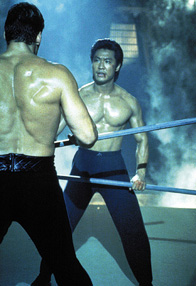GOLDSEA | ASIAMS.NET | ASIAN AMERICAN PERSONALITIES
BEST OF THE FISTS
PAGE 3 OF 8
| "If a man is thrown into water when he doesn't know how to swim, he's going to start paddling, he's going to do all he can to stay above water." |
Q: Did you feel the challenge of trying to fight social expectations when you decided to go into film?
A: Yes and no. Part of you is feeling like you must be a failure because you're not doing what all the other Asian kids do. I always did what I wanted to do, even at a young age.
When the Ninja-Kawasaki motorcycle came out, it was the fastest, most high-powered cycle you could get at the time. It was something I always wanted to get, and I was always afraid to get, because of the horror stories about fatal crashes and all that. But it's something that I had to do, so I bought a motorcycle when I was in my early 20s. I rode it to San Francisco from Los Angeles in four hours once, I was averaging 120 or 130 miles per hour. I think back now, and I think I must have been crazy. But it's something that I had to get off my chest. Luckily, it got stolen.
Q: Was going into the movie business a similar kind of impulse, that desire to go against the grain?
A: I've always wanted to do things that other people stayed away from. I don't know, ever since I was young I did a lot of things that other people would not do, that I wanted to try out, wanted to understand. I was very outgoing in that sense. I think a person who takes a lot of chances has a chance to fail, but will be the one who gains the most if it pays off. I think you should take chances when you're young, so you don't have to do it when you're old. So in that respect I'm always taking chances, I always put my money where my mouth is.
Q: What's the first thing you remember about getting into film-making as a profession?
A: I opened up an office, a production company, back in 1983. It was sink or swim. I said, OK, I'm going to commit myself, and I can't turn back.
Q: Did you have any financial support, any scripts or anything?
A: Nothing. It's amazing what a person is capable of doing. It's very strange, because there are times in our lives when we feel distraught, whether financially or emotionally, but we always get out of it. I learned early on that if a man is thrown into water when he doesn't know how to swim, he's going to start paddling, he's going to do all he can to stay above water. And basically, that's the philosophy I took. I made this commitment, I'm going to give it 10 years, and if I'm not where I want to be in 10 years then I'll get out.
Q: What were the alternatives to that?
A: I could have opened up a martial arts school, gone to law school, that kind of thing.
Q: You were already teaching martial arts, so opening a school would have been fairly easy, right?
A: I didn't want my love for my art to become everything. The love, the respect that I have for the martial arts is a part of me, but I did not want to make it a career. The movie business is very interesting, I wanted to do it because I didn't find anything else interesting.

Q: Were you at all motivated by a desire to change the Asian image in Hollywood, to do something about the stereotypes in movies?
A: Absolutely. That was a big part of it all along.
Q: Was there anything else that motivated you to get into it?
A: Well, I looked at a couple of things. I said, OK, if you want to get into a financially rewarding career, what could you do? Be an attorney, a doctor, someone in the record business, a musician, or somebody in the entertainment business. Entertainment I like because I can express myself artistically. There's a great satisfaction in making something from nothing.
I'm always up for a challenge, ever since I was a kid. One time when I was about 19 years old, I was living in Alameda at that time, and this kid said, "You can't jump from that tree to that tree." And I said, "Yes I can." He said, "No you can't, you're a chicken." So I jumped. I made it to the other tree but the branch broke off, and I broke both of my arms. But even then, if somebody challenged me to do something, I was very eager to do it to prove they were wrong. That has always been my somewhat dangerous philosophy.
Everybody said, "You're nuts going into the film industry. You're a minority, you don't know what you're doing..." PAGE 4
| PAGE 1 | 2 | 3 | 4 | 5 | 6 | 7 | 8 |
CONTACT US
|
ADVERTISING INFO
© 1996-2013 Asian Media Group Inc
No part of the contents of this site may be reproduced without prior written permission.
